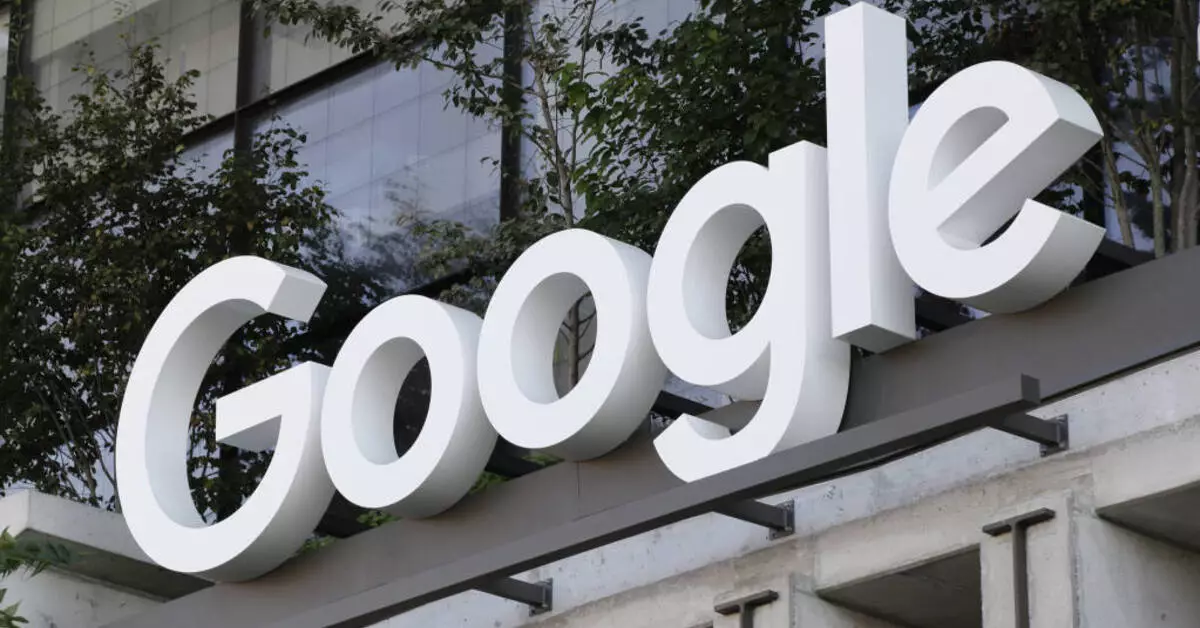Just a week after celebrating its 25th birthday, Google finds itself in the hot seat facing tough questions from the U.S. government regarding its internet search dominance.

Last Tuesday, Google CEO Sundar Pichai marked the company’s milestone with a reflection on its history. He discussed Google’s unlikely successes, acknowledged its failures, and recounted the challenges it has faced over the years, including questions about its future.
Pichai wrote, “In the 2000s, it was ‘how long can the web really last?’ In the 2010s, people were wondering if we could adapt to the era of mobile computing, and if search was “over.” Each time, we’ve come back even stronger.
However, just one week after this reflection, Google is now confronted with a different kind of challenge—a legal battle against the federal government. This historic Google’s Antitrust case could have far-reaching implications for the tech industry and is being closely watched by other Silicon Valley giants. This prompts significant inquiries regarding Google’s expansion strategies and whether they might have included unlawful activities.
The upcoming trial, U.S. et al v. Google, marks the first major competition trial of the modern internet era and stands as the most significant tech antitrust case since Microsoft’s legal battle with federal prosecutors over 20 years ago. However, the landscape has changed dramatically since Microsoft’s case, which centered on the company’s use of its market dominance in PCs to promote Internet Explorer. During that time, the internet was still in its nascent phase.
Today, technology companies have a pervasive presence in nearly every aspect of our daily lives, from smartwatches tracking our activities to driverless cars navigating our streets, and even AI models like ChatGPT helping to craft speeches for politicians.
Antitrust law scholar and Santa Clara University School of Law’s dean emeritus, Donald Polden, aptly describes the impending legal showdown: “It’s going to be quite a battle. Microsoft’s antitrust monopolization case was a landmark event in the tech industry. The current case against Google is taking place in a much more dynamic and competitive market. It’s the first big stake in the ground from the federal government.” This trial indeed represents a significant milestone in the government’s efforts to address competition and antitrust concerns in the tech industry.
At the core of the lawsuit, which was initially filed in 2020 by the Department of Justice and several states, are Google’s contracts with device manufacturers—lucrative agreements that establish Google search as the default option on various devices. A pivotal element of these business arrangements is a contract between Google and Apple, the value of which remains undisclosed but is estimated to be in the billions. This agreement designates Google as the default search engine on iOS, the operating system powering iPhones, iPads, and MacBooks.
According to the Department of Justice’s original lawsuit, Google CEO Sundar Pichai and Apple CEO Tim Cook held a meeting in 2018 to explore ways to enhance their revenue through collaboration. Following the meeting, an Apple employee communicated to a Google employee that “Our vision is that we work as if we are one company.” At the time, the DOJ alleged that nearly half of Google’s search traffic originated from Apple devices. The lawsuit further asserted that Google considers losing this agreement a “Code Red” scenario, underscoring its paramount importance to the company.
The Department of Justice (DOJ) filed a pre-trial brief on Friday, saying that Google’s default distribution agreements make it hard for people to switch to other search engines, which helps Google maintain its monopoly on the general search market. The DOJ says that Google’s agreements with device manufacturers and carriers give Google an unfair advantage over its rivals, making it difficult for them to compete.
In a poetic countermove, Google pointed to a blog post authored by their legal luminary, Kent Walker, which had dawned on the digital landscape that very day. In this eloquent declaration, Walker avowed, “Within the hallowed halls of the courtroom, we shall unfurl the tapestry of truth, demonstrating that our Search distribution alliances are born of choices woven by web browsers and device architects, a symphony harmonized by the excellence of our offerings and the melodies of consumer desires. This grand overture, facilitating the acquisition of desired goods, is a boon to the people, in harmony with the serenade of American antitrust statutes.”
Google also included step-by-step graphics in the blog post illustrating how to change Safari’s default search engine, highlighting that it takes two clicks on desktop and four clicks on iPhones. This information appears to emphasize Google’s argument that users have the freedom to choose their preferred search engine.
The trial arrives at a critical juncture for Google, as the company faces growing challenges in the tech landscape. The emergence of OpenAI’s ChatGPT has caught Google off guard, prompting the company to reorganize its teams and accelerate product development efforts, despite Google’s pioneering history in the field of AI. Google’s defense is expected to argue that competitors like OpenAI and Amazon are formidable rivals, while the federal government is likely to contend that Google’s monopoly position provides it with an unfair advantage in controlling emerging technologies such as AI.
For years, Google has faced such criticisms but has remained immensely successful. The company currently handles approximately 90% of all online searches in the United States, serving as the bedrock of Google’s dominant advertising business. This advertising business accounts for the majority of the company’s annual revenue, which amounts to around $280 billion, and has propelled Google to a market capitalization of $1.7 trillion.
This trial marks the initial salvo in a broader antitrust battle. Earlier this year, the Department of Justice (DOJ) filed a separate antitrust lawsuit against Google, this time focusing on the company’s digital advertising operation and online auction process. Simultaneously, Google faces ongoing scrutiny in Europe, where it has already incurred substantial fines for what regulators deemed “abusive” advertising practices and contracts related to Android.
The trial, expected to span 10 weeks, will feature notable figures from the tech industry. Testifying witnesses are anticipated to include Google CEO Sundar Pichai, as well as a roster of executives from both Google’s partners and competitors, including Apple, Microsoft, and smaller tech startups. The primary objective of this trial is to determine if Google has violated antitrust laws. If found liable, a subsequent trial will be convened to determine potential remedies, which could include monetary damages or restructuring of the company.
While the case is a landmark legal battle, its scope has been significantly narrowed compared to its original form, which represents a notable victory for Google leading up to the trial. In August, Judge Amit Mehta, who presides over the trial in the District of Columbia, made substantial reductions in the case’s scope. He did so on the basis that, in certain arguments, the government had failed to demonstrate the necessary anticompetitive effects required to establish Google’s violation of antitrust laws. Consequently, Judge Mehta dismissed key elements of the complaint, including arguments related to whether Google designed its search pages to push out third-party services like Yelp or Tripadvisor.
As the trial weaves its intricate narrative, Google’s rivals stand sentinel, their eyes affixed to the unfolding drama. In the hushed corridors of antitrust expertise, Donald Polden, a sage of law and the emeritus dean of Santa Clara University School of Law, observed, “Beyond the spotlight, other companies may be lurking in the wings, pondering, ‘If the government were to tilt the scales against Google, could this serendipitously turn the tides in our favor?’ This trial might just be the overture that ushers forth strategic epiphanies and illuminates the technological frontier for other industry stalwarts.”
Indeed, Richard Socher, CEO of You.com, an AI-based search engine, expressed his hope that the government will rein in Google. He emphasized the significance of default settings and the critical role of Google’s deal with Apple. Socher’s company’s product is not among the search engines that users can select as defaults on Apple’s Safari browser (nor is it among the pre-set options). Holding Google accountable could potentially create space for more competitors, providing consumers with a broader range of choices.Socher emphasized, “The crucial aspect here is spreading the word.” Once consumers know about this, they’ll realize that they actually have a choice.”
In recent years, major tech companies have increasingly become the focus of antitrust regulators and lawmakers. Meta, the parent company of Facebook, has faced scrutiny for its acquisitions of competitors like Instagram and WhatsApp. The Federal Trade Commission (FTC) attempted, unsuccessfully, to prevent Meta from acquiring the VR startup Within. Amazon has also been under congressional scrutiny for its private-label business, which includes Amazon-branded products in various categories such as clothing, food, and consumer goods.
Related: The Google’s Antitrust Trial – Defaults, Dominance, and the Battle for Search Supremacy
Socher’s perspective reflects the broader sentiment that competition in the tech industry is a pivotal concern for regulators and policymakers. The outcomes of these antitrust cases could potentially reshape the landscape of the tech industry and open up new opportunities for innovation and competition.
Google is about to face an unprecedented level of scrutiny in the coming weeks as it navigates a high-stakes antitrust trial. While the company has previously been subject to investigations, it has largely avoided serious consequences, which some consumer advocacy groups argue has only strengthened its position.
In 2013, the Federal Trade Commission (FTC) concluded a two-year investigation into Google over allegations of biased search results but ultimately did not take any enforcement action. Recently, Google settled with a group of states in an antitrust lawsuit related to its app marketplace and the 30% fee it charges software developers. The trial for this case had been scheduled for next month.
Critics argue that Google’s perceived lack of accountability, particularly concerning its financial interests, has allowed the company to operate with relative impunity. They see the current antitrust trial as an opportunity to reshape the internet and create more options and choices for users.
The outcome of the trial could have significant implications not only for Google but also for the tech industry as a whole, potentially impacting competition, market dynamics, and consumer choice.









